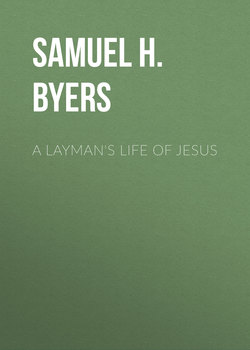Читать книгу A Layman's Life of Jesus - Samuel H. M. Byers - Страница 2
CHAPTER I
ОглавлениеPalestine two thousand years ago. The Little Land of Galilee. An Oriental Village. The Boy Carpenter.
One of the beauty spots of the world, a couple of thousand years ago, was the little land of Galilee, in upper Palestine. That was a land for poets and painters.
Lonesome, deserted, and little inhabited as it seems now, there was a time when this little paradise of earth had many people and many handsome cities. "In my time," says Josephus, "there were not less than four hundred walled towns in Galilee." Nature, too, was lavish in its gifts to this little land. There were green valleys there, picturesque mountains, clear blue lakes, running brooks, and grassy fields. An Eastern sun shone on the province almost all the time. There was no winter there. Like a diamond in the very heart of this beautiful land sat the town of Nazareth, "The Flower of Galilee." Close by the village were the hills that fenced in the upper end of the plain of beautiful Esdralon. Figs grew there at Nazareth, and oranges, and grapes luscious and bountiful as nowhere else. The flower-lined lanes stretched from the village clear down to the blue lake of Galilee, only a dozen miles or so away. It must have been a delight to live in a climate so delicious, in a land so lovely.
It all belonged to Rome then, as did the whole country known as Palestine. The Romans had divided the land into three provinces, – Galilee, Samaria, and Judea, with its splendid city of Jerusalem, then one of the noted capitals of the world. Governors or kings were appointed for these three provinces by the emperors at Rome; they were usually Orientals.
Just now two sons of Herod the Great, oftener known as "the splendid Arab," are ruling there. The one named Herod is at Jerusalem; his brother Antipater, or Herod Antipas, is governing little Galilee in the north end of Palestine. Like many another Oriental king he is an idle, luxurious, dissipated, and corrupt ruler.
There is yet another brother of these two kings. His name is Philip, and he lives in Rome. He has a very beautiful wife, who some day is to bring great trouble on the world, for Antipater will yet desert his Galilean queen and marry this Roman beauty.
It is all in the time of the great Augustus that we are talking of now. In Rome it is called the Golden Age. It is not quite that in Palestine. Yet the world's greatest era is just beginning there. In how small a territory the world's greatest deeds are about to be enacted! Palestine, taken all together, did not make much of a country in area; many of the states in the American union have more square miles, but all the nations in the world combined have no such history. Palestine is a strip of territory reaching along the Mediterranean for one hundred and fifty miles on one side, and along the Arabian desert on the other. It is hardly over sixty miles across. It is topographically of the most diversified character. It has some beautiful valleys and purling streams; it has mountains, too, lofty and desolate, and its principal lakes are almost a thousand feet below the level of the sea. The whole land is cut in two lengthwise by the Jordan river, the most peculiar, the most rapid, and the most historic river on the face of the earth.
We are now in Galilee. In the midst of the wonderful beauty of the scene at Nazareth any one would be attracted by the appearance of a youth there who is just out of school. This Nazareth, though not His birthplace, is His home; here all His brothers and sisters and cousins live. In a village close by His mother Mary was born. The boy's own birth was at a country inn up near Jerusalem, at a time when His parents had gone there to pay taxes, and be counted as citizens of the Roman empire.
The lovely little village where this youth is, happy among His kith and kin, is not unlike many an Oriental village of to-day. Strange little stone-paved streets run into the open square where the fountain of the village is. And this is the fountain where, on summer evenings, the village girls, among them the beautiful Mary herself, came for water. The little square, and the streets, and possibly some of the old houses, and the ruins of the fountain are there yet, in this 1912, and clustering vines and roses are still there – and so too are the clear skies, the starlit nights, the purple hills, and the dark-eyed women, just as in the long ago.
